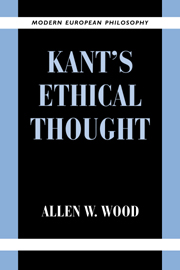Book contents
- Frontmatter
- Contents
- Preface
- Abbreviation
- Introduction
- I METAPHYSICAL FOUNDATIONS
- 1 Common rational moral cognition
- 2 Rational will and imperatives
- 3 The formula of universal law
- 4 The formula of humanity as end in itself
- 5 The formula of autonomy and the realm of ends
- II ANTHROPOLOGICAL APPLICATIONS
- Conclusion
- Notes
- Index
3 - The formula of universal law
Published online by Cambridge University Press: 05 June 2012
- Frontmatter
- Contents
- Preface
- Abbreviation
- Introduction
- I METAPHYSICAL FOUNDATIONS
- 1 Common rational moral cognition
- 2 Rational will and imperatives
- 3 The formula of universal law
- 4 The formula of humanity as end in itself
- 5 The formula of autonomy and the realm of ends
- II ANTHROPOLOGICAL APPLICATIONS
- Conclusion
- Notes
- Index
Summary
Objective practical principles
Kant's initial formulation of the principle of morality is “formal” because it is derived from the “mere concept of a categorical imperative” (G 4:420). A categorical imperative or “practical law,” Kant says, must be “valid in the same form for all rational beings” (KpV 5:19,21). Hence it must determine the will “on grounds which are valid for every rational being as such” (G 4:413). The reason for following it must be “the formal supreme determining ground of the will regardless of any subjective differences among human beings” (KpV 5:32). This must be a reason that is overriding for all rational beings, in the sense that it is the strongest reason they have (though not necessarily the reason that in fact motivates them the most strongly). It must also be numerically the same reason for all rational beings. A categorical imperative “must contain exactly the same determining ground for the will of all rational beings and in all cases” (KpV 5:25).
What sort of ground or reason might this be? Clearly, no empirical desire, not even the universal desire we all have for happiness, will meet the conditions required to ground a categorical imperative, for the desire for happiness is of merely empirical origin and not numerically the same reason for you as it is for me.
- Type
- Chapter
- Information
- Kant's Ethical Thought , pp. 76 - 110Publisher: Cambridge University PressPrint publication year: 1999

